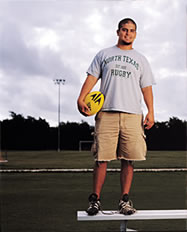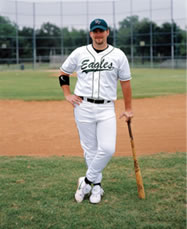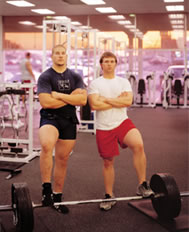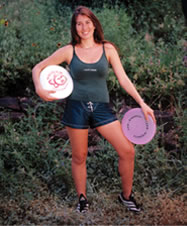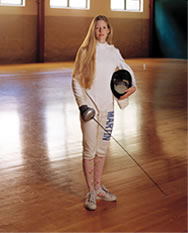| |

Recreational sports at UNT

For
the Fun of the Games
Cheering
on the Green and White
Q:
Who is the Most Straightforward Host on TV Today?
A
Taste for Adventure |
|
|
When
Jacob Provence entered UNT, he thought he'd said goodbye
to playing baseball. An avid player with more than 10 years of
experience in the sport, Provence had received baseball scholarship
offers from several junior colleges, but he turned them down
to go to a four-year university.
Once at UNT, however, he found himself missing the game.
"I was being really lazy. I thought I was burned out
on baseball, but it turns out I wasn't," he says.
Fortunately, he found a way to play again. Provence became an outfielder
for UNT's
baseball club, one of the sport clubs sponsored by UNT's recreational
sports office. The team plays 14 games during the spring semester.
"When I joined, I started to see why I got into baseball
in the first place. I really missed it," Provence says.
The
competition
In existence
since the 1970s, UNT's sport clubs include soccer, rugby,
cricket, and even billiards and chess clubs.
They differ from UNT's intramural teams because students
in the clubs compete against students from other colleges and universities,
not just other UNT students. The clubs may
also compete against community teams.
Most are in leagues and have competitive schedules similar to National
Collegiate Athletic Association teams. The baseball club plays
in the Gulf Coast Conference of the National Club Baseball Association.
The rugby club is a member of Division II of the Texas Rugby Union.
Members of the weightlifting club go to collegiate-division tournaments
sponsored by the USA Powerlifting Organization, and fencing club
members compete in the North Texas division of the United States
Fencing Association.
Learning as you go
Many students
join the clubs as an alternative to playing on NCAA teams, says
Sue Delmark, director of the recreational sports office.
"Members of sport clubs don't have to follow NCAA rules, and
they don't have to have a certain skill level to join a club.
The clubs all take beginners and teach them the sport," she
says.
The clubs also differ from NCAA teams by not having paid coaches.
They have volunteer coaches approved by the recreational sports
office.
Some coaches are club members. Max Winter, who serves as the
fencing club's coach, placed 20th out of 180 fencers in
national competition two years ago.
"Fencing is not a sport you can
pick up out of a book. You have to practice constantly," he
says. Billiards
club president David Alexander moved from Division C, the lowest
division for players at tournaments, to Division A, the highest
division, within two years after transferring to UNT from a junior
college. Now he's teaching other billiards club members.
"Most members are C players. For every tournament, we want
to move at least one C player to the B division," Alexander says. "Everyone
on the club learns from each other."
Michael Ashmead had heard little about rugby before he learned
the game from rugby club members four years ago.
"I played
football and ran track in high school, and I wanted to still
play a competitive sport," he says. "It
was rewarding for me to walk off the field after a game when
I didn't know
the game the year before."
Students already skilled in a sport join the clubs to continue playing.
Rugby club president Josh Rodriguez belonged to a community team
in his hometown of Round Rock.
"All across the United States, rugby isn't a varsity sport in
high school or college," he says. "It's seen
as similar to football, but football has just a few minutes of
activity
at a time, while players in rugby can run for 80 minutes straight."
Hours
of practice
Regardless
of the reason for joining, many sport club members say they're
committed to their sports — financially and otherwise.
Unlike members of NCAA teams, sport club members receive no scholarships
for playing. And while the clubs receive funding each year from
student service fees, no set amount is guaranteed.
The recreational sports office provides partial funding for travel
to tournaments and games. Members, however, often pay out-of-pocket
expenses.
"We're creative about allocating our money," says
fencing club president Jessica Martin, "because we always
want to send at least one person to the national tournament,
and that costs $1,000 a person."
Sailing club members pay $25 a semester to practice at the Dallas
Corinthian Yacht Club on Lake Lewisville.
Baseball club members buy their own uniforms and spend
a large amount on travel for two- or three-game road series,
says Landy Warren ('01), the team's pitcher.
"We've paid for each other if necessary," he says.
Hours
of practice
In addition
to financial commitments, sport clubs can require a large time
commitment from members.
Several students say it's not enough for members to attend
practices — they must also practice and exercise on their
own to become skilled and fit enough for the sport.
"Our scheduled
workout time is Mondays through Fridays from 1 to 5 p.m., but
that's
really the minimum workout time for competitive weightlifting,"
says weightlifting club president Bobby Claxton. "I put in more
hours in the evenings."
The billiards club has a set 3-hour practice time in the University
Union Syndicate each week. But Alexander says he practices at
least 10 hours a week between classes and
on weekends.
"I
add an extra five hours before tournaments," he says. However, no sport club members are penalized for not
coming to practice, games or tournaments.
"If a member has a big paper due, we won't kick
that person off the team for not showing up for a few weeks,
even though we have to scramble to make substitutions," says
Sheena Connell, co-president of the ultimate disc— non-contact Frisbee football — club.
Victories
and friendships
Delmark
says that with no pressure for members to come
to practices or games, club sports "are often seen as not
as competitive as varsity sports."
However, the clubs usually represent UNT well in competitions.
The rugby club qualified for the Texas Rugby Union tournament in
1998, 1999 and 2002. The baseball club had an 8-5 record for 2003,
posting big wins over Texas Christian and Texas Tech universities.
The fencing club has sent members to the national tournament for
the past four years, and Claxton and another weightlifting club
member, Andrew Harbour, qualified for the national tournament of
the USA Powerlifting Organization this year.
Sport club members say friendships with those interested
in their sports are often more important than competition, however.
"In ultimate disc, you can go to a strange city and play
with a team for one day, and everyone treats you like you're part
of the team," says ultimate disc club co-president Scott
Wray. "I also like to play with people of all ages. I've
played with 50-year-olds who are great."
Ashmead agrees.
"I've made some of my best friends by playing rugby,"
he says. 
|
|



